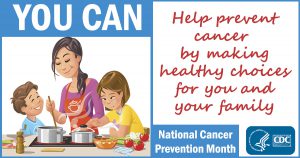Lowering Your Cancer Risk: A Matter of Ups and Downs
Posted on by
Think of listening to your favorite song. No matter what kind of music it is, someone was behind the scenes making it sound great: bringing out certain parts or instruments, balancing it, getting rid of background noise.
Cutting your cancer risk is a little bit like making great music. You turn some things up, turn some things down, and get rid of some things altogether. And you don’t have to be a professional to make choices that can help keep you doing what you love for a long time.
Turn It Up!
- Knowledge. Cancer can be a scary topic, and you might want to avoid thinking about it. But the more you know, the better prepared you can be. CDC has lots of easy-to-understand information about cancer. If you still have questions, ask your doctor for help getting the answers you need. Having relatives with cancer can make it more likely that you are at risk.
- Physical activity. Being active keeps your heart, lungs, and muscles much healthier, while helping to lower cancer risk.
- Screening. Routine tests are recommended to look for some cancers, like breast, colorectal (colon), and cervical cancers. Who gets these screening tests and when can vary depending on your gender and your age. But getting the ones you need at the right time can help prevent cancer or find it early, when it’s easier to treat.
- Vaccines. Did you know vaccines can prevent some kinds of cancer? Arm the next generation against certain cancers caused by human papillomavirus (HPV) by getting every child vaccinated at age 11 to 12. If you have a new baby, chances are your little one got the hepatitis B vaccine, but adults who might be at risk can get it, as well. Hepatitis B can lead to liver cancer if it isn’t treated, so the best way to prevent it is to avoid the virus.
Turn It Down!
- Your weight. More than half of all people in the United States are overweight or have obesity. Overweight and obesity are linked to at least 13 different types of cancer. And these cancers make up a shocking 40% of all cancers diagnosed. Physical activity and making healthy food choices can help you keep your weight lower, along with your cancer risk.
- Alcohol use. Overuse of alcohol doesn’t just harm your liver. Binge drinking is the most common and deadly pattern of alcohol use. It can lead to cancer of the mouth, throat, colon, and other areas of the body. People who use alcohol should drink in moderation, and it’s recommended that people who don’t drink at all don’t start drinking.
- UV exposure. Skin damage from ultraviolet (UV) radiation is the main cause of skin cancer, the most common cancer in the United States. Many cases of skin cancer can be prevented by using sun protection like sunscreen of SPF 15 or higher, wearing protective clothing, and staying in the shade.
Cut It Out!
- Tobacco use. You’ve seen it everywhere from cigarette packs to billboards: smoking is dangerous. Lung cancer is the number one cancer killer, and smoking causes 80% to 90% of all lung cancer deaths. But cigarettes and other tobacco products are linked to different types of cancer too. If you smoke, you can cut your cancer risk right now by quitting. Being around other people smoking can be just as bad for you as smoking yourself!
- Indoor tanning. Using tanning booths, beds, or lamps damages skin with UV radiation. There isn’t a safe way to tan. Stay sun-safe and don’t use indoor tanning devices at all.
Like creating a great song, creating a healthy body is a matter of ups and downs. A few simple choices can help you engineer a lifetime with lower cancer risk…and that should be music to your ears!
Categories Other
Page last reviewed: Tuesday, June 23, 2020
Page last updated: Tuesday, June 23, 2020
Content source:
Division of Cancer Prevention and Control
Post a Comment